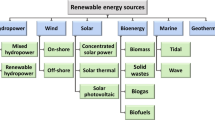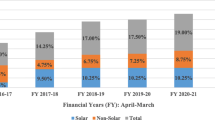Abstract
To achieve energy efficiency and to develop supporting policy tools have become priorities worldwide. In this respect, one of the important energy efficiency policy tools is Energy Efficiency Obligation Scheme (EEOS). Turkish Government, dealing with regulations about energy efficiency since 2007, has placed EEOS in the current agenda in parallel with the global improvements. The authorities agree that EEOS could be a proper mechanism for Turkey to achieve its targets on energy efficiency. This study aims to propose a possible basic EEOS structure for Turkey as well as to present a comparative analysis of the design and implementation of the EEOS’s best practices and key issues. Hence, in addition to the review of the EEOS, currently active in the European Union (EU), proper alternatives for Turkish EEOS were enlightened through expert analysis. In order to evaluate the expert opinions, Bayesian Belief Network (BBN) is implemented as a framework for uncertainty. The possible basic structure of Turkish EEOS, involving responsible authorities, related parties, support mechanisms, and basic properties of the scheme, is constructed according to experts’ opinions. Related BBN analysis reveals the success probability of this structure as about 84%. Moreover, for the improvement of this success, the following implications can be considered from the best practices in the EU: the scheme must be compatible with the country’s specific circumstances and have flexibility in application, promotive opportunities, and deterrent penalties and should be open for improvement.








Similar content being viewed by others
References
Bassamzadeh, N., & Ghanem, R. (2017). Multiscale stochastic prediction of electricity demand in smart grids using Bayesian networks. Applied Energy, 193, 369–380. https://doi.org/10.1016/j.apenergy.2017.01.017.
Ben-Gal, I. (2008). Bayesian networks. Encyclopedia of Statistics in Quality and Reliability, 1. https://onlinelibrary.wiley.com/doi/full/10.1002/9780470061572.eqr089.
Bertoldi, P., Castellazzi, L., Oikonomou, V., Fawcett, T., Spyridaki, N. A., Renders, N., & Moorkens, I. (2015). How is article 7 of the Energy Efficiency Directive being implemented? An analysis of national energy efficiency obligation schemes. In Proceedings of ECEEE Summer Study. European Council for an Energy-Efficient Economy, Presqu’Ile de Giens, France.
Bertoldi, P., & Rezessy, S. (2008). Tradable white certificate schemes: fundamental concepts. Energy Efficiency, 1, 237–255. https://doi.org/10.1007/s12053-008-9021-y.
Bertoldi, P., Rezessy, S., Lees, E., Baudry, P., Jeandel, A., & Labanca, N. (2010). Energy supplier obligations and white certificate schemes: comparative analysis of experiences in the European Union. Energy Policy, 38(3), 1455–1469. https://doi.org/10.1016/j.enpol.2009.11.027.
Broc, J. S., CAPPE, D., Deconninck, C., Jeandel, A., Lees, E., Kiela-Vilumsone, L., ... & Nadal, F. (2015). Snapshot of Energy Efficiency Obligations schemes in Europe: main characteristics and main questions. http://atee.fr/sites/default/files/1-snapshot_of_energy_efficiency_obligations_schemes_in_europe_27-5-2015.pdf. Accessed 4 Aug 2019.
Broc, J. S., Stańczyk, W., Reidlinger, B. (2020). Snapshot of Energy Efficiency Obligation schemes in Europe (as of end 2019). Provisional Version. ENSMOW Report. https://ensmov.eu/wp-content/uploads/2020/06/ENSMOV_Snapshot_EEOS_provisional.pdf. Accessed 11 July 2020.
Cai, B., Huang, L., & Xie, M. (2017). Bayesian networks in fault diagnosis. IEEE Transactions on Industrial Informatics, 13(5), 2227–2240. https://doi.org/10.1109/TII.2017.2695583.
Cinar, D., & Kayakutlu, G. (2010). Scenario analysis using Bayesian networks: a case study in energy sector. Knowledge-Based Systems, 23(3), 267–276. https://doi.org/10.1016/j.knosys.2010.01.009.
Constantinou, A. C., Fenton, N., Marsh, W., & Radlinski, L. (2016). From complex questionnaire and interviewing data to intelligent Bayesian network models for medical decision support. Artificial Intelligence in Medicine, 67, 75–93. https://doi.org/10.1016/j.artmed.2016.01.002.
Crossley, D., Gerhard, J., Lees, E., Kadoch, C., Bayer, E., Xuan, W., Watson, E., Wasserman, N., & Sommer, A. (2012). Best practices in designing and implementing energy efficiency obligation schemes. Montpelier: Regulatory Assistance Project Retrieved from http://www.raponline.org/document/download/id/5003.
Deconninck, C., Broc, J. S., Kiela-Vilumsome, L., Oikonomou, V., Thomas, S., Rosenow, J., ... & Signoret, S. (2017). Snapshot of Energy Efficiency Obligations schemes in Europe: 2017 update. Retrieved from https://atee.fr/system/files/2020-05/2017_snapshot_of_eeos_in_europe.pdf. Accessed 4 Aug 2019.
Directive. (2012). Directive 2012/27/EU of the European Parliament and of the Council of 25 October 2012 on energy efficiency, amending Directives 2009/125/EC and 2010/30/EU and repealing Directives 2004/8/EC and 2006/32. Official Journal, L, 315, 1–56 Retrieved from http://data.europa.eu/eli/dir/2012/27/oj.
Directive. (2018). Regulation (EU) 2018/1999 of the European Parliament and of the Council of 11 December 2018 on the Governance of the Energy Union and Climate Action, amending Regulations (EC) No 663/2009 and (EC) No 715/2009 of the European Parliament and of the Council, Directives 94/22/EC, 98/70/EC, 2009/31/EC, 2009/73/EC, 2010/31/EU, 2012/27/EU and 2013/30/EU of the European Parliament and of the Council, Council Directives 2009/119/EC and (EU) 2015/652 and repealing Regulation (EU) No 525/2013 of the European Parliament and of the Council. Official Journal, L, 328/1. Retrieved from http://data.europa.eu/eli/reg/2018/1999/oj.
ENSPOL. (2015a). Energy saving policies and energy efficiency obligation scheme D2.1.1: report on existing and planned EEOs in the EU – part I: evaluation of existing schemes. Retrieved from http://enspol.eu/sites/default/files/results/D2.1.1 Report on existing and planned EEOs in the EU - Part I Evaluation of existing schemes.pdf?v=2. Accessed 4 Aug 2019.
ENSPOL. (2015b). Energy saving policies and energy efficiency obligation scheme D2.1.2: report on context profiles of EU MS countries – part III: context analysis of countries with existing/planned EEOs. Retrieved from http://enspol.eu/sites/default/files/results/D2.1.2 Report on Context Profiles of EU MS countries - Part III Context analysis of countries with EEOs.pdf?v=2. Accessed 4 Aug 2019.
ENSPOL. (2016). Energy saving policies and energy efficiency obligation scheme D2.1.1: report on existing and planned EEOs in the EU – part II: description of planned schemes. Retrieved from http://enspol.eu/sites/default/files/results/D2.1.1 Report on existing and planned EEOs in the EU - Part II Description of planned schemes.pdf?v=3. Accessed 4 Aug 2019.
European Bank, Energy Community. (2019). Energy efficiency obligation schemes: policy guidelines deep dive on key policy mechanism that can be deployed under Article 7 of the Energy Efficiency Directive. Retrieved from https://www.energy-community.org/dam/jcr:7907f720-0904-48a0-9773-2bd948ff2799/EBRD_EnCS_PG_EE_112018.pdf+&cd=1&hl=tr&ct=clnk&gl=tr. Accessed 9 April 2020.
European Commission. (2017) Obligation schemes and alternative measures. Retrieved from https://ec.europa.eu/energy/en/topics/energy-efficiency/energy-efficiency-directive/obligation-schemes-and-alternative-measures Accessed 4 Aug 2019.
European Commission. (2018) National energy efficiency action plans and annual reports. Retrieved from https://ec.europa.eu/energy/topics/energy-efficiency/targets-directive-and-rules/national-energy-efficiency-action-plans_en?redir=1 Accessed 4 August 2019.
European Commission (2019). Commission Recommendation (EU) 2019/1658 of 25 September 2019 on transposing the energy savings obligations under the Energy Efficiency Directive. Official Journal, L 275, 28.10.2019, p. 1–93. Retrieved from http://data.europa.eu/eli/reco/2019/1658/oj. Accessed 9 April 2020.
EVÇED. (2020). The regulations page of Energy Efficiency and Environment Department of MENR website. Retrieved from http://www.yegm.gov.tr/verimlilik/v_mevzuat.aspx. Accessed 14 July 2020.
Fawcett, T., Rosenow, J., & Bertoldi, P. (2019). Energy efficiency obligation schemes: their future in the EU. Energy Efficiency, 12(1), 57–71. https://doi.org/10.1007/s12053-018-9657-1.
Gindele, T., Brechtel, S., & Dillmann, R. (2015). Learning driver behavior models from traffic observations for decision making and planning. IEEE Intelligent Transportation Systems Magazine, 7(1), 69–79. https://doi.org/10.1109/MITS.2014.2357038.
Giraudet, L., Bodineau, L., & Finon, D. (2012). The costs and benefits of white certificates schemes. Energy Efficiency, 5, 179–199. https://doi.org/10.1007/s12053-011-9134-6.
Heckerman, D. (1997). Bayesian networks for data mining. Data Mining and Knowledge Discovery, 1(1), 79–119. https://doi.org/10.1023/A:1009730122752.
Heckerman, D., & Wellman, M. P. (1995). Bayesian networks. Communications of the ACM, 38(3), 27–31. https://doi.org/10.1145/203330.203336.
Holmes, D. E. (Ed.). (2008). Innovations in Bayesian networks: theory and applications (Vol. 156). Springer. https://doi.org/10.1007/978-3-540-85066-3.
Hosseini, S., & Barker, K. (2016). A Bayesian network model for resilience-based supplier selection. International Journal of Production Economics, 180, 68–87. https://doi.org/10.1016/j.ijpe.2016.07.007.
Larrañaga, P., & Moral, S. (2011). Probabilistic graphical models in artificial intelligence. Applied Soft Computing, 11(2), 1511–1528. https://doi.org/10.1016/j.asoc.2008.01.003.
Law. (2007). Energy Efficiency Law of Turkey, Kanun no: 5627. Resmi Gazete, 26510, Mayıs. https://www.resmigazete.gov.tr/eskiler/2007/05/20070502-2.htm.
Moore, A. W., & Zuev, D. (2005). Internet traffic classification using bayesian analysis techniques. ACM SIGMETRICS Performance Evaluation Review, 33(1), 50–60. https://doi.org/10.1145/1064212.1064220.
Nadkarni, S., & Shenoy, P. P. (2004). A causal mapping approach to constructing Bayesian networks. Decision Support Systems, 38(2), 259–228. https://doi.org/10.1016/S0167-9236(03)00095-2.
Neapolitan, R. E. (2004). Learning bayesian networks (Vol. 38). Upper Saddle River: Pearson Prentice Hall http://www.cs.technion.ac.il/~dang/books/Learning%20Bayesian%20Networks(Neapolitan,%20Richard).pdf. Accessed 4 Aug 2019.
Pavan, M. (2012). Tradable white certificates: experiences and perspectives. Energy Efficiency, 5, 83–85. https://doi.org/10.1007/s12053-010-9104-4.
Republic of Croatia. (2017). Fourth National Energy Efficiency Action Plan of the Republic of Croatia for the period from 2017 to 2019. Retrieved from https://ec.europa.eu/energy/sites/ener/files/hr_neeap_2017_en.pdf. Accessed 15 April 2019.
Republic of Turkey Ministry of Development. (2013). Tenth development plan 2014-2018. Retrieved from http://www.sbb.gov.tr/wp-content/uploads/2018/11/The_Tenth_Development_Plan_2014-2018.pdf. Accessed 4 Aug 2019.
Republic of Turkey Ministry of Energy and Natural Resources. (2012). Energy Efficiency Strategy Paper 2012-2023. Retrieved from http://www.resmigazete.gov.tr/eskiler/2012/02/20120225-7.htm. Accessed 4 Aug 2019.
Republic of Turkey Ministry of Energy and Natural Resources. (2015). Strategic plan of Ministry of Energy and Natural Resources 2015-2019. Retrieved from https://sp.enerji.gov.tr/ETKB_2015_2019_Stratejik_Plani.pdf. Accessed 4 Aug 2019.
Republic of Turkey Ministry of Energy and Natural Resources. (2018). National Energy Efficiency Action Plan (NEEAP) 2017-2023. http://www.yegm.gov.tr/document/20180102M1_2018_eng.pdf. Accessed 4 Aug 2019.
Republic of Turkey Ministry of Environment and Urbanisation. (2010). Climate change strategy 2010 2023. Retrieved from https://webdosya.csb.gov.tr/db/iklim/editordosya/iklim_degisikligi_stratejisi_EN(2).pdf. Accessed 4 Aug 2019.
Republic of Turkey Ministry of Environment and Urbanisation. (2011). National Climate Change Action Plan (2011–2023). Retrieved from http://www.dsi.gov.tr/docs/iklim-degisikligi/%C4%B1depeng.pdf?sfvrsn=2. Accessed 4 Aug 2019.
Republic of Turkey Ministry of Foreign Affairs. (2020). History of Turkey - EU relations. Retrieved from https://ab.gov.tr/111_en.html. Accessed 9 April 2020.
Rosenow, J., Cowart, R., Thomas, S., & Kreuzer, F. (2017). Market-based instruments for energy efficiency—policy choice and design. International Energy Agency: Paris http://www.eeeb.ir/uploads/1/2019/Aug/05/MarketBased_Instruments_for_Energy_Efficiency.pdf.
Rosenow, J., Fawcett, T., Eyre, N., & Oikonomou, N. (2016). Energy efficiency and the policy mix. Building Research and Information, 44, 562–574. https://doi.org/10.1080/09613218.2016.1138803.
Tang, C., Yi, Y., Yang, Z., & Sun, J. (2016). Risk forecasting of pollution accidents based on an integrated Bayesian Network and water quality model for the South to North Water Transfer Project. Ecological Engineering, 96, 109–116. https://doi.org/10.1016/j.ecoleng.2015.11.024.
Waide, P., & Buchner, B. (2008). Utility energy efficiency schemes: savings obligations and trading. Energy Efficiency, 1(4), 297–311. https://doi.org/10.1007/s12053-008-9024-8.
Zarei, E., Mohammadfam, I., Azadeh, A., Khakzad, N., & Mirzai, M. (2018). Dynamic risk assessment of chemical process systems using Bayesian Network. Iran Occupational Health, 15(3), 103–117. https://doi.org/10.1002/prs.11889.
Acknowledgments
We are thankful to all energy experts, sharing their valuable opinions. Specifically, two energy experts are from the Republic of Turkey Ministry of Energy and Natural Resources, one from the Turkish Energy Exchange Company, and two academics from Istanbul Technical University. In the case of foreign experts, they are from France, India, the Netherlands, and Greece.
Author information
Authors and Affiliations
Corresponding author
Ethics declarations
Conflict of interest
The authors declare that they have no conflict of interest.
Additional information
Publisher’s note
Springer Nature remains neutral with regard to jurisdictional claims in published maps and institutional affiliations.
Rights and permissions
About this article
Cite this article
Cin, R., Acuner, E. & Onaygil, S. Analysis of energy efficiency obligation scheme implementation in Turkey. Energy Efficiency 14, 4 (2021). https://doi.org/10.1007/s12053-020-09914-z
Received:
Accepted:
Published:
DOI: https://doi.org/10.1007/s12053-020-09914-z




